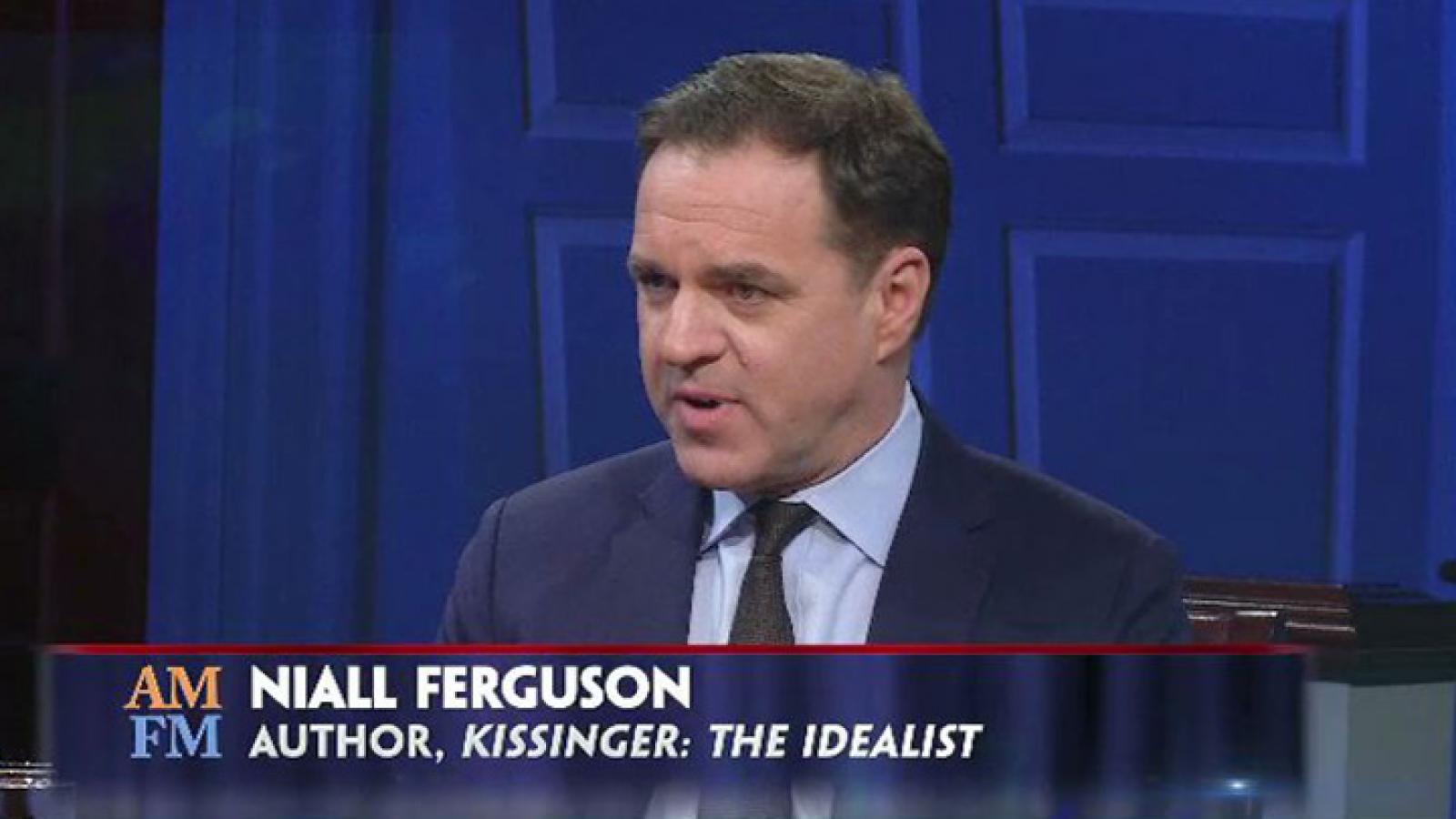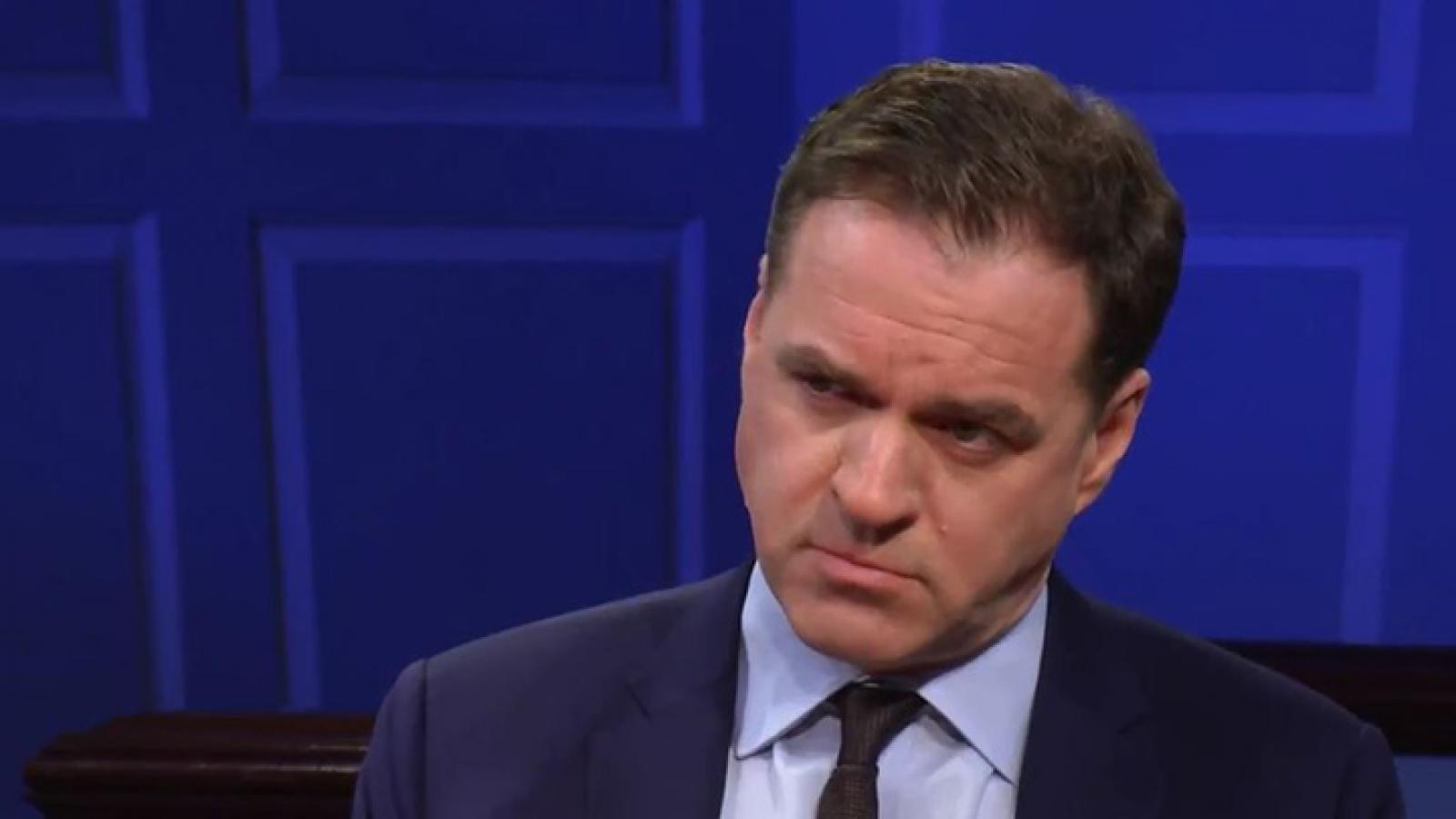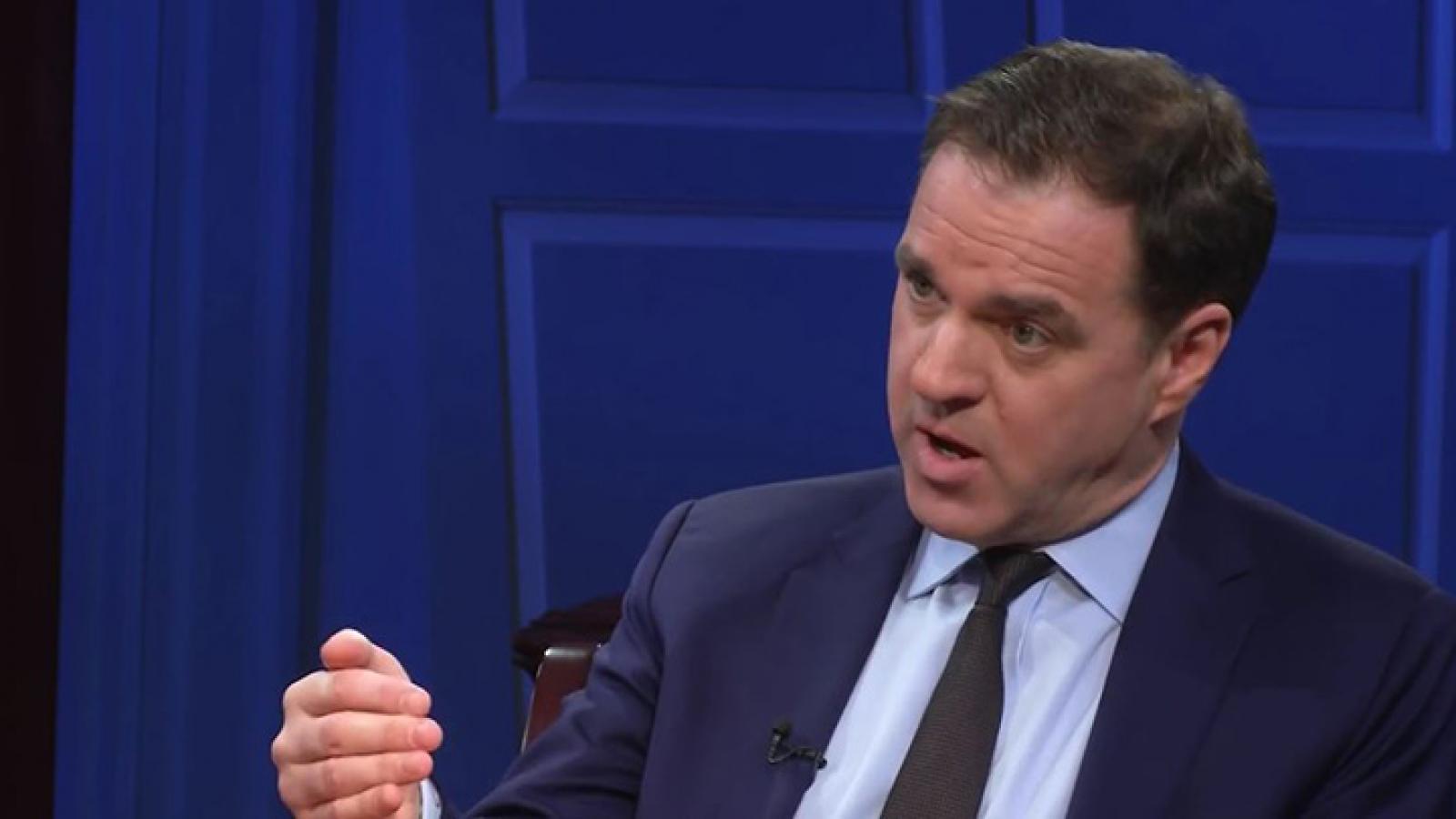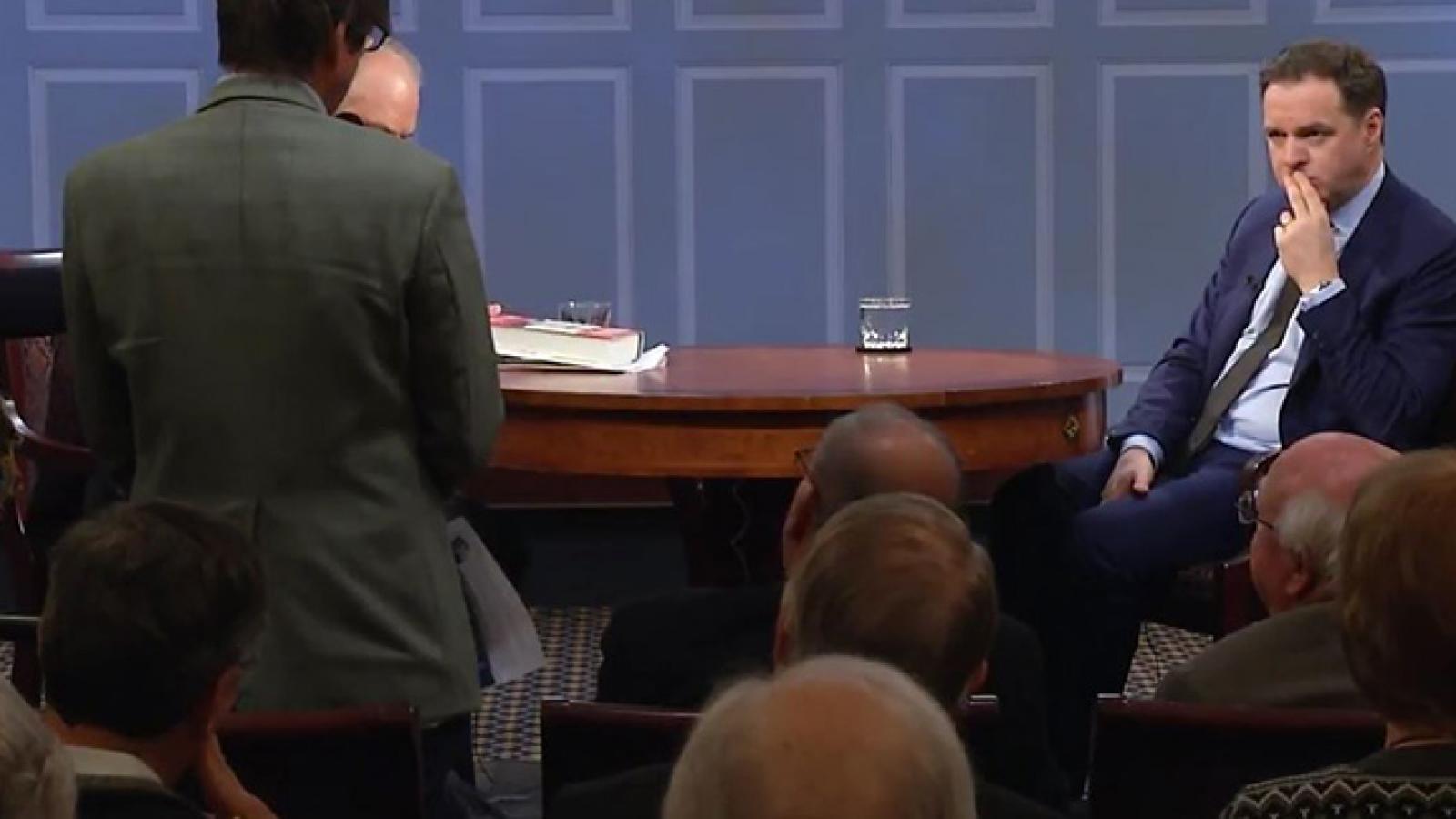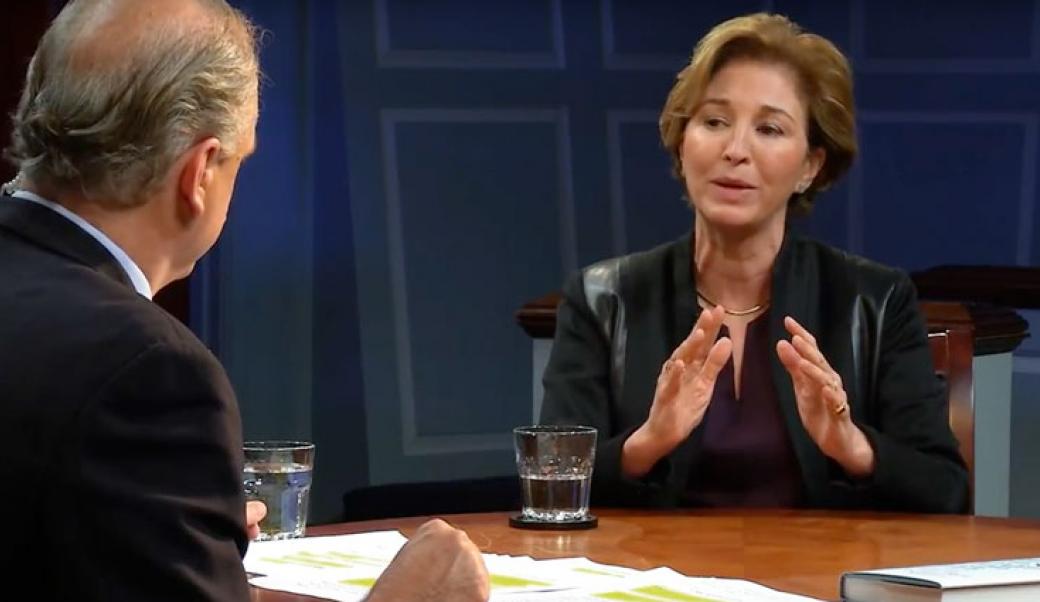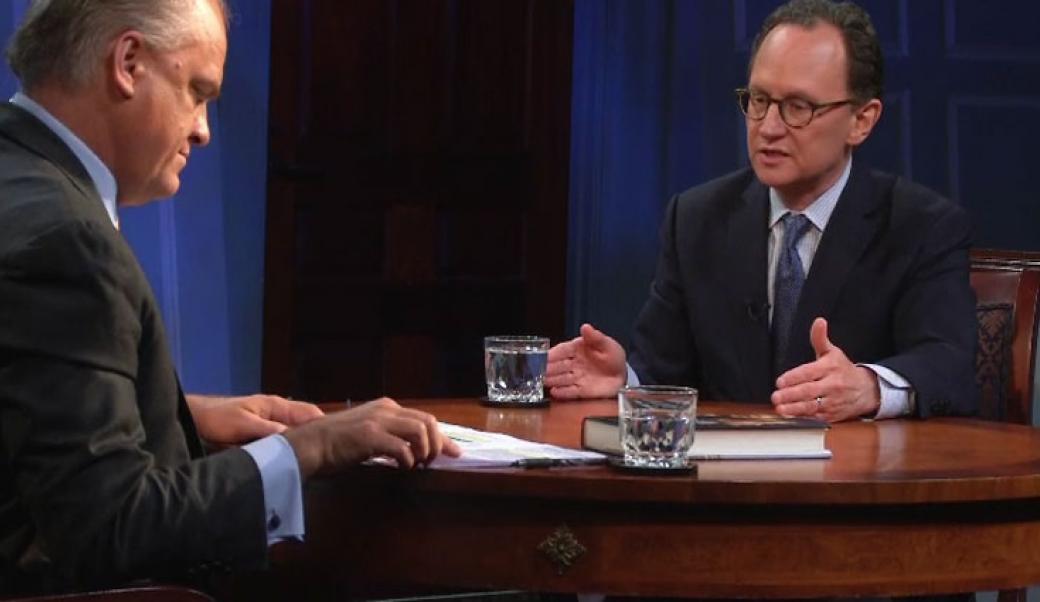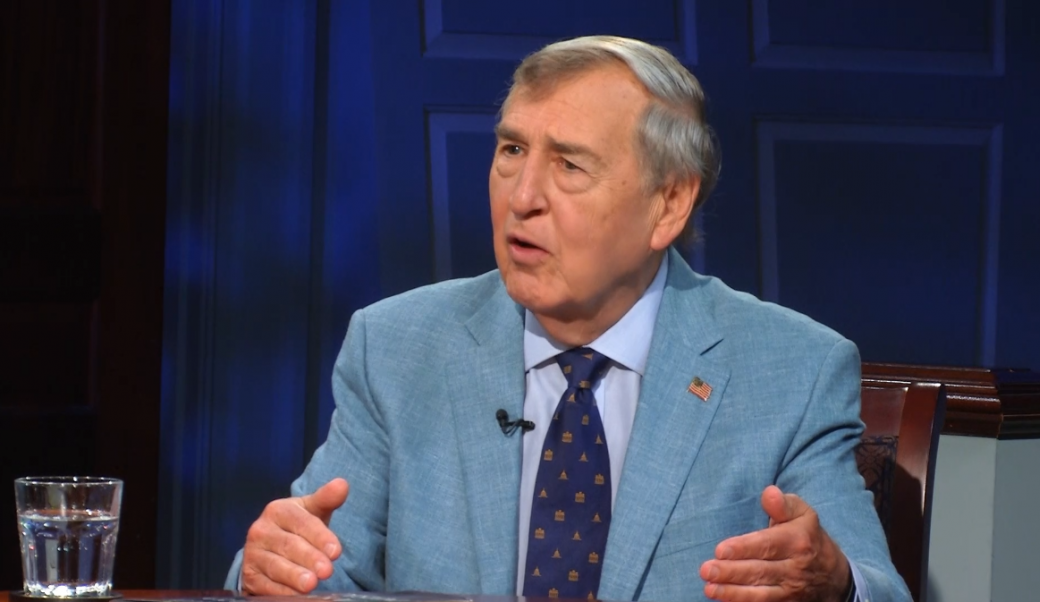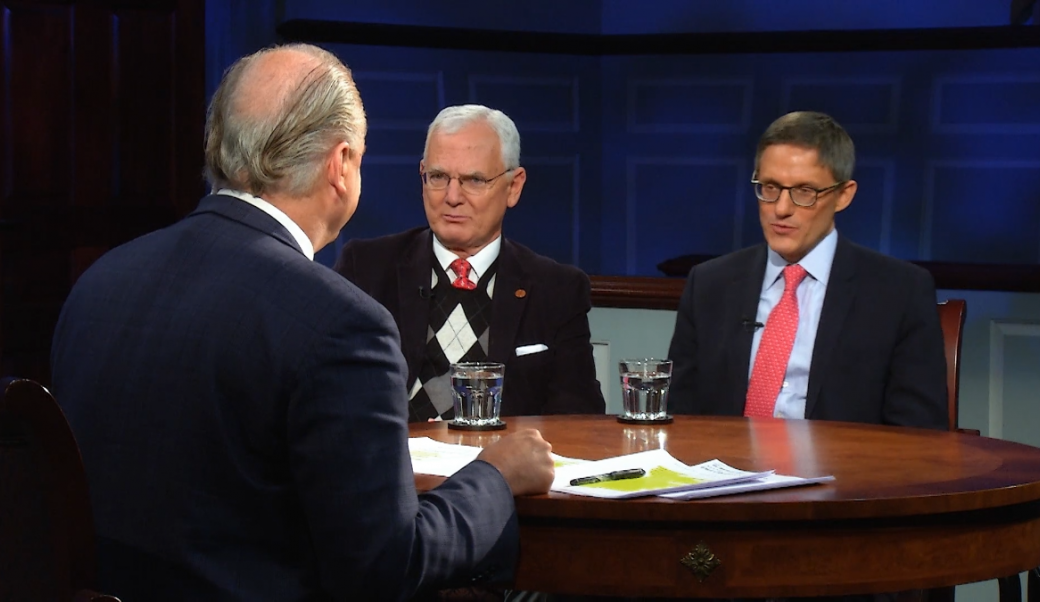About this episode
September 02, 2016
Niall Ferguson
Niall Ferguson is the Laurence A. Tisch Professor of History at Harvard University. He is also a senior fellow at the Hoover Institution, Stanford University, and a senior research fellow at Jesus College, Oxford. In "Kissinger," Ferguson draws not only on the former secretary of state's closed private papers but also on documents from more than 100 archives around the world.
Foreign Affairs
Henry Kissinger 1923-1968: The idealist
Transcript
00:40 Douglas Blackmon: Welcome back to American Forum. Nearly 15 years after the 9/11 terrorist attacks, and over the course of two full presidential administrations, there is a broad sense among many Americans that U.S. diplomacy and geopolitical strategy are in shambles. The massive and, according to many, ill-fated invasion of Iraq, by President George W. Bush. The Middle East meltdown that followed. The rise of ISIS. President Obama’s alleged blunders in Libya, Syria, and in response to Russia’s Vladimir Putin.
FACTOID: Syrian civil war killed or injured more than 200,000 by fall 2015
Whatever your politics, recent American foreign policy has often looked like a disaster no grand strategists, no wizards of diplomacy, no supermen, or women, of foreign policy. Our guest today is Harvard historian Niall Ferguson, the author of a new biography of former Secretary of State Henry Kissinger, the larger than life U.S. diplomat who, a generation ago, appeared to many Americans to be precisely the kind of strategic genius we don’t seem to have today. But Henry Kissinger also came to be seen as a deeply controversial figure, accused by some of almost traitorous behavior and terrible crimes of war. Ferguson’s book, one of 14 he has written, is the first installment of a two-volume, authorized biography, and focuses on the story of how Kissinger emerged from harsh beginnings as a young Jewish boy driven from Nazi Germany to become over 40 years’ time a leading American intellectual, the U.S. Secretary of State, a major architect of the Vietnam War, and an advisor to at least seven presidents. Thanks for joining us.
FACTOID: The Question: How did Henry Kissinger become such an influential statesman?
Niall Ferguson: It’s a pleasure to be with you Doug.
Blackmon: So for many people, the, the controversy around Henry Kissinger, we remember him, um uh, as this huge figure, ah, but the controversy that attaches to him has to do primarily with events that occurred in southeast Asia and elsewhere in a period of time that you’re going to deal with in the second volume of the, of this biography that you’re writing. But you do address, you invoke some of the criticisms of him in this discussion and you do address what some people call the Anna Chennault Affair, but this story from the 1968 presidential election, uh, that, uh, and an allegation that, that Kissinger was involved in some sort of subterfuge related to the peace negotiations on Vietnam that were going on in Paris. But tell us what the Anna Chennault Affair was, and when you looked at it in this book, what was the conclusion that you ultimately arrived at?
FACTOID: Chenault was a Chinese American active in Republican politics
Ferguson: Well this is a difficult one because most of your viewers will be baffled to hear that there was someone called Anna Chennault and so would, um, Henry Kissinger have been since he had absolutely no contact with a woman who’s said by some historians to have been a key source, uh, to the Nixon campaign of what the Johnson administration had up its sleeve during the 1968 election. In order to understand what the heck this is all about you have to just have some background. 1968: incredibly fraught year in American history. We think we’re polarized now, it was a lot worse then, there was a lot more violence then, uh, anti-war protests were really beginning to spill over in many campuses, uh, and the election was a hard fought one and an unusual one, because the incumbent president, Lyndon Johnson, uh, decided not to run, uh, and so long standing Republican political professional Richard Nixon, uh, became the Republican candidate, and was running against Vice-President Hubert Humphrey. There was also a segregationist candidate, George
FACTOID: Anti-war protests peaked in 1968 after TET offensive
FACTOID: Wallace was segregationist governor of Alabama 1963-1967
Wallace, in the mix. In all of this, the Vietnam War played an absolutely crucial role, and the Nixon campaign was very anxious that there might be an October surprise and indeed there was, because Johnson announced at the very last minute, just before the vote happened, that he was going to end the bombing of North Vietnam, and begin talks in Paris with Hanoi. So the key question has been asked, was whether there was any, you used the word “subterfuge,” and dirty dealings that allowed information about what Johnson was doing to get to the Nixon campaign.
FACTOID: President Jonson addressed nation on bombing halt on October 31, 1968
Now I’m not going to talk about Anna Chennault because she has absolutely nothing to do with my biography of Henry Kissinger. Kissinger in 1968 was not on the Nixon campaign, number one, he was actually an advisor to Nelson Rockefeller, uh, one of Nixon’s arch-enemies in the Republican party, and Kissinger had been a Rockefeller advisor in three elections out of three, which Rockefeller had failed to get the nomination in. So that’s an important starting point for this. You also need to bear in mind that Kissinger’s a professor at Harvard. He’s not really a major political figure at all by this point, though he’s well known as a commentator.
FACTOID: Rockefeller served as Ford’s vice president and as governor of New York
FACTOID: 1954-69 Kissinger was Harvard professor of government
05:29 Blackmon: And he’s also not a particular fan of Richard Nixon over time.
Ferguson: Deeply hostile to Nixon; had avoided Nixon, uh, in the 1950s and 1960s, uh, only met him for the first time, uh, in December 1967. So the argument that’s been made, uh, Seymour Hersh was the first person to make it; Christopher Hitchens then picked it up and ran with it, was that Kissinger leaked confidential information, classified information, about Johnson was up to to the Nixon campaign in order to get a job from Nixon. And I show this story is incredibly implausible. In fact it has absolutely no shred of evidence to support it.
FACTOID: In 2001, Chris Hitchens published The Trial of Henry Kissinger
What Kissinger was actually doing in 1968, and that’s what I can show because I’ve had access to Kissinger’s private papers, was a) Advising Rockefeller, not Nixon, b) Writing a whole bunch of papers on what the next president should try to do better in national security strategy, he was pretty busy with that, uh. He didn’t have any access to classified information. Everybody knew that the Paris peace talks were going on, because unlike previous talks, they were public; everybody knew about them. Kissinger had actually been involved with secret negotiations to end the war the year before, but they had gone nowhere. So the key issue here is: What did Kissinger say to Nixon, and also why did he give him any assistance at all? And the answer is 1) Rockefeller told Kissinger after Rockefeller had failed to get the Republican nomination, “We hate Nixon, but it’s got to be better than Humphrey, particularly because we’re trying to move towards a more constructive policy on Vietnam, and we think the Republican platform is better than the Democratic one.” 2) Kissinger then gave some analysis to a member of the Nixon campaign about what he was going to happen. Now if there’ s a smoking gun, this is it, because there is a document that shows somebody, it’s almost certainly Kissinger, spoke with someone in the Nixon campaign about what was happening. This was in September. There’s nothing in that document to suggest there was classified information passed, because Kissinger didn’t really know anything about what was going on in Paris that wasn’t in the New York Times. So the key point is what was said. And what was said was an analysis of the situation if you read the document closely. Uh, Johnson’s trying to do something. He may do something. You should watch out. There may be an October surprise, well come on; everybody knew that. That wasn’t worth terribly much. And the rest of the document’s actually about the Soviets, the Middle East, and the implications for the election of changes in foreign policy at the last minute. So I show that, yeah, there was some conversation between Kissinger and the Nixon campaign, there was also a conversation between Kissinger and the Humphrey campaign. And it’s important to know, and this is the final point I’ll make, that in previous elections, under Rockefeller’s direction, Kissinger had offered his expert advice in foreign policy to candidates on both sides
08:28 Blackmon: I want to probe a little deeper into this because it is the one thing that you actually spend a good bit of a reasonable amount of space on in the book, with his reputation. So it seems like it’s worth digging into and also about a year ago we had, sitting in that same chair, one of the scholars who’s written about this and made the charges that, uh, that you refute in the book. And that’s Ken Hughes, a historian who’s written specifically about this particular incident. And he does point to some, you know, there’s an FBI document that, you know, from a wiretap, that talks about this woman Anna Chennault, was in communication, and you acknowledge that too, that she existed.
Ferguson: Can I interrupt?
Blackmon: Of course.
Ferguson: This has got nothing to do with Henry Kissinger, at all. I mean, I’ve seen those FBI documents, you’ll look in vain for any reference to Kissinger’s name, and I mean, I think there’s an interesting story here of how Nixon was, uh, waging the campaign with the kind of tricks we associate with Nixon, but also, I mean not only with Nixon, there was all sorts of skullduggery going on in that election, and I think the key point here is, um, did the South Vietnamese really need Richard Nixon to have been informed by anybody, that there was an October surprise coming that they would then need to sabotage. Anyone who’s been properly trained as a historian that, uh, on that test this case collapses, because it was absolutely clear to anybody who read the papers, uh, that there was an October surprise in the pipeline, and that secondly a Nixon administration would be tougher than the Humphrey administration. That was because they both made their positions absolutely clear, and therefore the South Vietnamese, who had pretty good intelligence sources of their own, they didn’t need any of this to know that this was in the pipeline and that they should hang tough. So I have to say, um, in the annals of historical scholarship and the foreign policy of the 1960s, this is one of the biggest red herrings I’ve come across.
10:20 Blackmon: What’s the origins of the, of this sentiment, this anti-Kissinger sentiment? Is it that these are honest mistakes of other journalists and scholars or, or is it that there’s some sort of political motivation over a period of time that has, that has propelled these continuing accusations about Kissinger, not just about that but things that came later?
Ferguson: Well I think that is an interesting question here about…about Kissinger’s reputation. Uh, in the 1970s, when he became famous, remember he’s not really famous at all in 1968, but once he’s actually famous as national security advisor then Secretary of State, we should remember that he’s a hero who’s frequently on the cover of Time and Newsweek magazine, Super K, in 1973 people think he’s the guy who’s really president as Nixon descends into the morass of Watergate. Making peace in the Middle East, a year before the opened China. In the 1970s when he’s actually in power, Kissinger’s reputation is extraordinarily high. He’s one of the most popular men in the United States, he’s ranking up there with sports and movie stars [Blackmon: Smartest man in the world, widely said.] Right, so the backlash against Kissinger in some ways begins at his alma mater, at Harvard, when there were colleagues who wanted to disassociate with the Vietnam War, which some of them had supported in the 1960s who very publicly condemned him after he had become part of the Nixon administration, people like Thomas Shelling for example, but it’s not really until much later that those sorts of attacks become popular. And you know, Chris Hitchen’s book and Hersh’s before it came a great deal later and a long time after Nix, Nixon’s fall from grace.
FACTOID: Hersh wrote The Price of Power on Kissinger’s role in Nixon government
I think in some ways Henry Kissinger inherited the animus against Nixon, and there’s an irony in this because as I show in volume one, Kissinger has really disliked and criticized Nixon repeatedly throughout the first half of his life, and had tried to avoid Nixon and there’s one occasion in 1960 when Nixon actually seeks out Kissinger’s advice on a specific subject and Kissinger kind of makes up a trip to Japan to avoid taking the meeting. Now you really want to avoid somebody if you say you’re going to be in Japan when they come looking for a meeting. So I think part of the story here is an irony, that that it’s only at the very last minute, in December 1968, that Nixon decides to give Kissinger the job of National Security Advisor. And Kissinger is totally amazed, he doesn’t even get when they have the meeting that he’s being offered the job. He assumes that maybe Nixon will offer Rockefeller a job, maybe at defense, and that he will then go and work for Rockefeller. It takes two calls to explain to Kissinger that no, he’s actually being offered National Security Advisor by Nixon, a man he had repeatedly and publicly condemned. So this irony is, that having thrown in his lot with Nixon by the end of 1968. By the 1980s and certainly by the 1990s, Kissinger starts to inherit some of the hostility to Nixon had been there in liberal America all along, and you get this growing story of the, the, the Dr. Evil figure, the war criminal whose every act under the Nixon Administration and indeed Ford has to be condemned, has to be exposed, as, as immoral. So one thing I really want to emphasize when I come to write volume two is that we shouldn’t exaggerate Kissinger’s importance. It’s the president that makes the key decisions, and it’s the president who should be held accountable for the bombing of Cambodia. You can complain if you dislike the policy that Kissinger went along with it when he could have resigned, it’s likely that he thought of resigning on more than on occasion but he didn’t. Then one can then make an assessment, but one can’t equate Nixon’s strategy with Kissinger’s because his advice wasn’t always taken.
14:14 Blackmon: That seems like a bit of a stretch actually, I was with you up to a point there but ultimately . . .
Ferguson: The buck stops here, that’s what I’m saying. And this is Truman’s point, and when you use a term like the Kissinger administration then you’re stretching.
14:27 Blackmon: Well I’m trying to. I’m just trying to realize that there’s more than one president in the picture, but, but . . .
Ferguson: Yeah, Ford gets almost no coverage in a lot of the literature. One of my challenges in Volume II is to give full, uh, I think, space to the Ford presidency, it’s the kind of poor relation in the historiography of the 1970s, but a huge number of very important things happened under Gerald Ford, not least, in, in Africa.
FACTOID: Kissinger was National Security Advisor, Secretary of State under Ford
You know, historians, serious historians, that is, not least in the, the unserious ones that you’ve been talking about, serious historians are very interested in the 1970s as a period when the Cold War become a great deal more complex. It became, as I’ve called it, the third world’s war. Not the third world war, that never happened, there was never a great nuclear war between the united states and the Soviet Union, but there was a war in the third world, and it was fought on a whole range of different places, uh, Cambodia’s familiar, Angola maybe less so. And the, the casualties in this third world’s war were enormous, and we forget just how much more violent the world was then than it is now. We think of the world as a terribly troubled uh, place today, but actually the two thousands were an order of magnitude less violent than the 1970s.
FACTOID: 55,000 Cuban soldiers were sent to support communist Angola
15:32 Blackmon: You’ve also written in, in contemporary times, you’ve written I think , the specific words that the Obama foreign policy is a disaster, I think that you, I can quote you on that. If the Obama policies have been a disaster, and they are rough, and you were saying that, they have equivalency to the Nixon-Kissinger era, does that mean the Nixon-Kissinger era was a disaster?
Ferguson: Well, uh, in many ways, uh, yes. Because one can hardly look back, uh, on the 1970s and say, for example, the, the, uh, war in, in Vietnam ended well. It ended disastrously, South Vietnam was not kept alive, it was ultimately overrun, and enormous numbers of people died and suffered terribly as a result of the imposition of, of communist rule. The escalation of violence in Cambodia brought pol pot to power, I mean the disasters are, are numerous. But, but it seems to me one has to be very clear about why disasters happened in the Cold War, and as I mentioned earlier, that means looking at what the soviets were doing to fuel disaster as well. It, it’s, bringing my point that too often we take together countries out of context and forget what the overall strategic framework of the Cold War was, uh, and it’s a different thing, it seems to me, to say that something was a disaster, uh, as opposed to a war crime. I mean, disaster happen, in, in foreign policy often with best intentions, uh, at the top. So that’s, that’s the way I would think about this, if one starts to talk about the recent, uh, Bush, and the current, uh, uh Obama administrations. If, if one were to look at, uh, the decision making of 2000, uh, 2001-2002, I don’t think it was entirely bad faith, there was some bad faith, but I don’t think it was entirely bad faith that led to the intervention, the intervention in Iraq. I’ve just been doing some work on that actually, trying to look at the, the reasoning that led to that, uh decision. And I think if one looks at the 2001-2002 national security strategy, which was really Bush’s doctrine spelt out, uh, it’s in fact full of high minded aspirations to bring democracy and even women’s rights, uh, to countries that the us then, uh, intervened in. The results proved to be disastrous for reasons that I anticipated in a book called Colossus that argued that the United States was highly unlikely to make a success of this great nation building program, especially in, in countries like Iraq and Afghanistan that had such a troubled uh, history. I think in the same way, uh, President Obama intentions were probably very good when he gave his famous speech in Cairo, uh, offering a kind of new era of relations between the united states and the Muslim world, but its ended in, in disaster and I think disaster is the right word to use when one talks about Syria.
FACTOID: Obama’s 2009 A New Beginning speech addressed Muslim world
18:08 Blackmon: And, if we try to apply uh, uh, Kissingerian approach to, to these kinds of, to the sorts of very contemporary questions, what would be the Kissingerian approach to, to that situation?
Ferguson: The book that I’ve written about the first half of his life shows that before he’d really had much exposure to the realm of power, he, he’d set up some pretty good precepts for the way that some should make foreign policy. Uh, one of them you’ve touched on, which ids the fact that most choices in foreign policy are actually between evils, and if you expect there to be a motherhood and apple pie option, you’ll never be able to do anything. So, choices between evils are inevitable in foreign policy that’s often forgotten by academics. You know, the toughest decision to take as an academic is whether to tenure a junior colleague. That, that’s not that touch a decision to be perfectly honest. So academics have to be very careful when they pass judgement on people who are deciding between war and peace. The, the second point that Kissinger made again, before he, he comes anywhere close to Richard Nixon is what he called the problem of conjecture. This is a brilliant insight, uh which I think policymakers today should be made to study. If you make a, a decision to do something, to preempt what you think is a disaster, and you’re right, uh, you take that decision and you maybe pay that cost and you avert disaster, no one is going to be grateful. Because, in, in a democracy people just aren’t grateful for averted disasters. Nobody today thanks, uh, Kissinger for the fact that there wasn’t World War III. Because we just kind of assume it was never going to happen. So the problem of conjecture tells you that you will get no thanks for doing a difficult thing even if you’re right and avert disaster, you’re much better advised to do nothing and play for time. This is what we call the kicking of the can down the road. And Kissinger makes a very good point about the 1930s and the policy of appeasement in, uh, in a 1957 piece. He said look, they, they, they that they would be really tough realists, they were playing for time, they were kicking the can down the road and hoping that, that Hitler would turn out to be just another German nationalist.
20:04 Blackmon: And he was refer - he was referring to Neville Chamberlain, and the (Ferguson: Absolutely) the, those appeasers (Ferguson: Right) specifically.
Ferguson: And it’s simply, you see, he calls them realists. Now, Kissinger is usually portrayed as the arch-realist, you know, someone who puts national interests above morality or any other considerations, but, as, as a younger man, right up really until the late 1960s, he repeatedly criticizes realism in foreign policy. Has a big falling out with Hans Morgenthau, the arch-realist, on the issue of Vietnam, and so appeasement, as a classic illustration of the problem of conjecture. In 1938, it would have been much better, uh for Britain to have gone to war against Germany while the going was good, before the Germans had the Nazi-Soviet pact in their pocket. But Chamberlain played for time, forgetting that everybody gets time when you play for time, and Hitler made better use of it than in fact Chamberlain did. So this is a really important point, uh that Kissinger had leaned long before he entered the White House.
FACTOID: Neville Chamberlain served as prime minister of the UK, 1937-40
Kissinger’s line is, that, that history is to nations what character is to individual people, which is a great line. And he makes the point that all too often, decision makers in Washington have a history deficit. Now they may have a law degree, who knows, but they don’t have, by and large, a history major. And the problem therefore becomes that you have decisions makers trying to read, say, the Russian president, without any knowledge of Russian history. And Kissinger’s point is that if you don’t know the history of your counterparts, you’re not going to understand them at all, you won’t understand what they’re trying to achieve. I think, both the Bush administration and the Obama administration illustrate all these points pretty well. And in that sense, this is a book that I think should be required reading, not just for historians who are interested in, uh, cold war, but for anybody who’s interested in strategic decision making.
21:48 Blackmon: Is it possible to do the kind of diplomacy that Kissinger would say we should be doing in the current environment?
Ferguson: Well I think it’s perfectly possible. We do have, the, the expertise, there’s no question that we have it both, in the diplomatic core and in the military. In some ways the military is probably in better shape, uh in that respect than its even been, uh, but problems are really right at the top where decisions get taken, uh, I I in the White House. And here it seems to me worth considering innovation in a president’s, in a council of economic advisors for a long time, but never a counsel of historical advisors. It strikes me, that uh, that this would be an eminently justifiable innovation, uh, why should the president not be able to say, what on earth are we going to do about ISIS, uh, historians, help me understand this problem, give me some analogies, uh, historians, this guy Putin, what’s he trying to achieve here? I don’t really get what he’s doing in Syria and Ukraine. And the job of the historians would be to sit down and say look, we don’t have a model, we’re, we’re not like our colleagues the economists, who think that you have a mathematical model for the world. We, we, we just have analogies. We’re going to tell you ten cases where the United States or some other power has confronted a threat like the Islamic State, or we’re going to give you ten examples of, uh Russian foreign policy intervention, or we’re going to help you think about the problem in those terms. If you look at decision making in the recent past, what is been conspicuous by its absence has been any systematic application of the lessons of history.
22:15 Blackmon: You just cosigned a letter along with a long list of other scholars with interest in foreign policy. Some say it’s a list of neocons. You don’t . . .
Ferguson: Well I’m definitely not a neocon. I bashed them so much during the Iraq War. I’m surprised they let me be on that list.
23:30 Blackmon: But it’s a letter expressing profound concerns about the possibility of Donald Trump becoming president of the United States for some of the reasons for reasons related to the territory we’ve been talking about today broadly. But very quickly why is it that Donald Trump as president of the United States would be the disaster that that long list of you suggested that it might be?
Ferguson: Well there’s a whole range of questions about Donald Trump’s character which would be legitimate to ask about anybody who is in contention for the presidency but let me focus not on those but on specific policy issues. Broadly speaking if one takes literally what Donald Trump says he is an anti-globalization, anti-free trade, anti-immigration candidate and that lies a large part of his popularity but I think many people in what we call Middle America, Republican voters who perhaps become disillusioned with party establishment do blame their problems on China, on Mexico and probably speaking on immigration. And I think if one had a president who decided who was going to impose tariffs on Chinese goods and build a wall across our border with Mexico and try somehow to get Mexico to pay for it, we would embark on a foreign policy disaster with a capital D. I mean this would be a disaster which would be a significantly larger disaster than the ones we’ve talked about because we’d undo very, very quickly the ties of good will that the United States has built up with countries all over the world. But this man would be a menace as president. And somehow or other we have to find a way of stopping him of getting the Republican nomination and if he should get it making sure he loses this election.
Blackmon: Niall Ferguson. Thank you for being here. His book is Kissinger: The idealist, 1923-1968. We hope you’ll join this conversation with American Forum on the Miller Center Facebook page, or by following us on Twitter @douglasblackmon or @americanforumTV or @nfergus. To send us a comment, watch other episodes, download podcasts or read a transcript visit us at millercenter.org/americanforum. I’m Doug Blackmon. See you next week.
